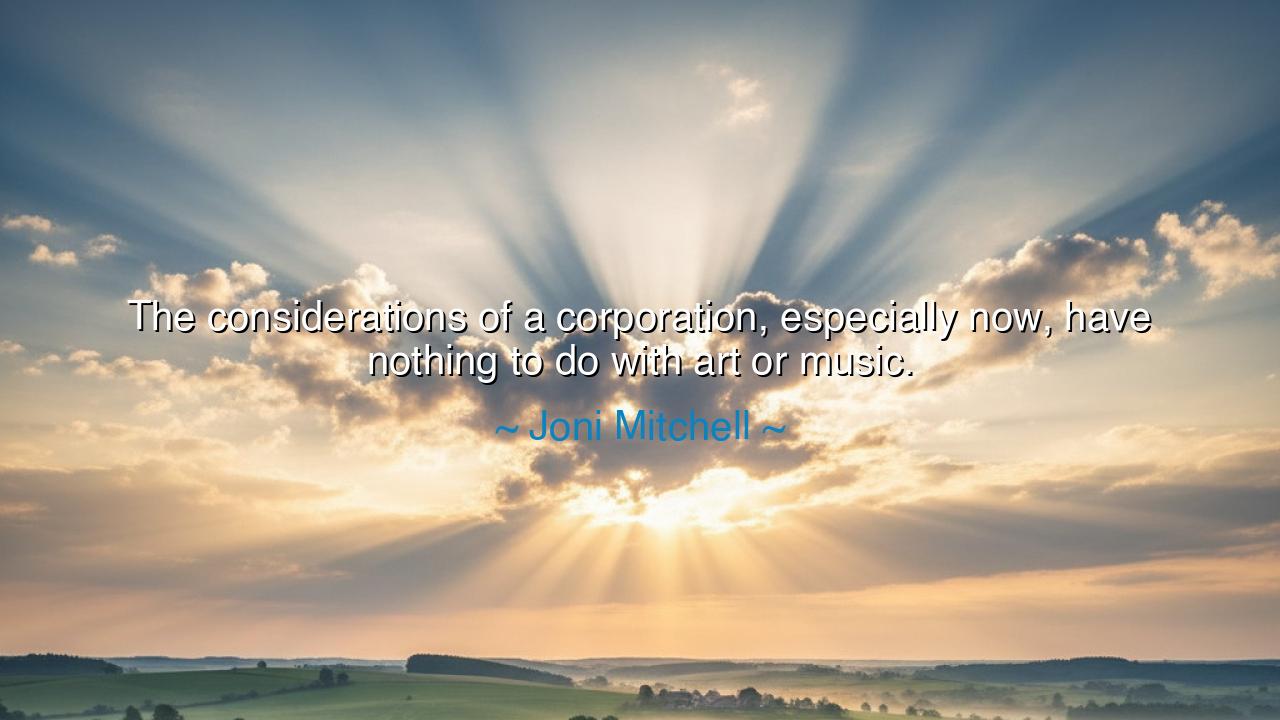
The considerations of a corporation, especially now, have
The considerations of a corporation, especially now, have nothing to do with art or music.






Joni Mitchell, the seeress of song, once declared with piercing clarity: “The considerations of a corporation, especially now, have nothing to do with art or music.” In these words, she lays bare the eternal conflict between commerce and creation, between the hunger of profit and the hunger of the soul. For corporations measure in numbers, in markets, in returns; but art measures in truth, in beauty, in the stirring of the human heart. Where the one seeks gain, the other seeks meaning. Where the one counts, the other sings.
Mitchell spoke from her own battles with the machinery of the music industry, which often pressed upon her to mold her work into something more marketable, more profitable, less risky. Yet art, true art, is not born to please the ledger but to reveal the soul. Her protest echoes the cry of countless artists before her: that music is sacred, and when chained to corporate calculation, it withers. What a corporation values is not melody, but sales; not vision, but market trends. Thus her words are a lament, but also a warning—that when art is yoked to the chariot of profit, it is dragged away from its divine purpose.
This struggle is not new. Consider the fate of Vincent van Gogh, who in his lifetime sold almost nothing, his paintings deemed unprofitable, unwanted by the market of his day. By corporate logic, he was a failure. Yet his art outlived the indifference of commerce; his canvases, born of torment and vision, now illuminate the world. The corporation did not see him, but humanity did. And so Mitchell reminds us: art belongs not to corporations but to the human spirit.
The truth is that corporations fear risk, while art is born of risk. The artist ventures into the unknown, daring to bring forth what has never been seen or heard before. But the corporation asks only: “Will it sell?” Thus we see music reduced to formulas, to safe imitations, to products designed not to inspire but to capture attention. Yet no formula has ever birthed a Beethoven, no balance sheet has ever conjured a Joni Mitchell. The great works of art come not from corporate strategy, but from solitary vision and the courage to follow it.
Still, Mitchell’s words carry more than critique; they carry a lesson. If corporations have nothing to do with art, then the artist must stand apart, preserving the sacred flame. The calling of the artist is not to appease the market, but to give voice to truth, even when it is unpopular, even when it does not sell. For history shows that what is dismissed today may be revered tomorrow, and what is exalted today may be forgotten tomorrow. The artist’s duty is not to profit, but to endure.
What lesson shall we take from this? That we, too, must guard the sanctity of what is beautiful in our lives. Do not measure every action by profit. Do not discard what is noble because it brings no immediate reward. In your work, in your relationships, in your creations, seek meaning first, and let profit follow if it will. To live only for the calculations of gain is to live half a life. To live for art—whether through music, kindness, or truth—is to live fully.
Practically, this means: support true artists, not just products. Seek out voices that dare to be different, that sing from the heart rather than from the boardroom. In your own life, create for the sake of creating—write, paint, sing, or build without asking what the market will pay. Let corporations have their charts and numbers; let you have your soul. For as Mitchell reminds us, the considerations of a corporation have nothing to do with art or music—and it is up to us, as makers and lovers of beauty, to keep them alive.
So let us carry this truth like a torch: art belongs to the strong, the vulnerable, the seekers of truth—not to corporations. Guard it, cherish it, create it, and pass it down. For commerce may rise and fall with the ages, but art, unbent by profit, endures forever.






AAdministratorAdministrator
Welcome, honored guests. Please leave a comment, we will respond soon